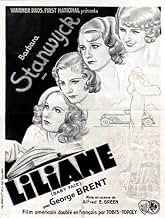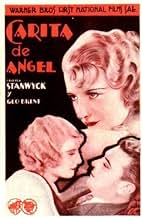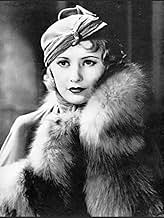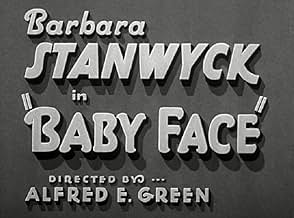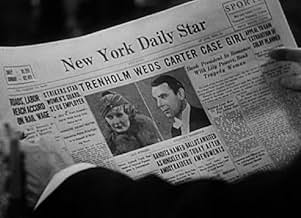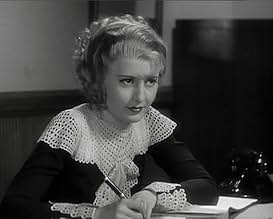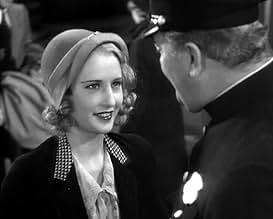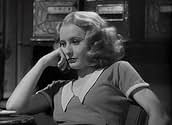Uma jovem, explorada sexualmente por toda sua vida, decide virar o jogo e explorar os homens infelizes de um grande banco da cidade - dormindo alegremente até chegar ao topo.Uma jovem, explorada sexualmente por toda sua vida, decide virar o jogo e explorar os homens infelizes de um grande banco da cidade - dormindo alegremente até chegar ao topo.Uma jovem, explorada sexualmente por toda sua vida, decide virar o jogo e explorar os homens infelizes de um grande banco da cidade - dormindo alegremente até chegar ao topo.
- Direção
- Roteiristas
- Artistas
- Prêmios
- 2 vitórias no total
- Brody
- (as Douglas Dumbrille)
- Job Seeker
- (não creditado)
- Foward
- (não creditado)
- Paris Bank Clerk
- (não creditado)
- Hodges
- (não creditado)
- Speakeasy Waiter
- (não creditado)
- Speakeasy Customer
- (não creditado)
- Paris Bank Agent
- (não creditado)
- Direção
- Roteiristas
- Elenco e equipe completos
- Produção, bilheteria e muito mais no IMDbPro
Avaliações em destaque
Barbara Stanwyck is indeed amazing in the role of Lily Powers (notice the moniker), a part that called for just the right amount of sexuality coated with power, cunning, and revenge, yet tinged with virginal pretense when called for, a very difficult portrayal to make convincing. Barbara Stanwyck conveys the necessary nuances to show that though she sleeps her way to the top (literally), she still has good in her heart--note the way she treats those few who have been kind to her such as Chico (the marvelous actress Theresa Harris) and the old philosopher. And though she exploits her sexuality to make mush of men who are rich and powerful, those same men are attempting to exploit her for their carnal desires with no intention of permanent ties until they fall in love with her.
Lily Powers fails to understand, at first, that emotions are difficult to ride, that it's easy to lose control. One possible result is death. Hitching a wagon to a star of course materialism can take one to a destination where nothing else exists but the ephemeral, and it's a cold lonely location.
A word should be said about the philosophy of Friedrich Nietzsche whose will to power is stressed in "Baby Face" by the elderly philosopher who befriends Lilly when she is still turning tricks for her old man. "Baby Face" was released the same year Adolf Hitler came to power in Germany. Though it's highly unlikely that the semi-literate Hitler understood much about Nietzsche, he considered himself a Nietzschean to the nth degree and touted it along side his other rantings. "Baby Face" serves as an indictment of the popular interpretation of Nietzsche's will to power concept, especially in the final scenes.
Although "You've got the cutest little baby face." is apropos as a theme for "Baby Face," an even more telling and applicable melody is W. C. Handy's "St. Louis Blues" played throughout the film, especially at times when the camera has to drift away from what would otherwise be sexually explicit scenes. "St. Louis Blues" is also used wisely toward the end as Lily begins to see beyond materialism to eternal values. Chico is singing a raw, salacious version of "St. Louis Blues" when Lily, now disagreeing with the lyrics, orders her to stop.
The restored version of "Baby Face" makes the film more modern in its approach and attitude toward sex as power than many a new Hollywood release. By all means watch this gem from the distant past and enjoy.
The focal point is on Lily Powers (Barbara Stanwyck), the sassy daughter of Nick (Robert Barrat), an abusive father of the slums of Pittsburgh who has her working as a barmaid in his speakeasy entertaining low-life factory working friends. After Nick is killed in an explosion, by which Lily watches, showing no remorse or emotion whatsoever, decides on leaving her hometown, accompanied by her friend, Chico (Theresa Haris) on a freight train for New York City. Upon her arrival, Lily uses whatever life has taught her to get ahead, rising up the corporate latter of a banking firm, by showing her feminine wiles to full advantage. Becoming responsible for the breakup between banker, Ned Stevens (Donald Cook) and his fiancée, Ann Carter (Margaret Lindsay), followed by a murder/suicide, the notorious scandal finds Lily about to transferred to the Paris branch until she captures the attention of Trenholm (George Brent), the new president of the Botham Trust Company, as her latest victim.
Featured in the supporting cast are Douglass Dumbrille (Brody, another one of Lily's "love slaves"); Nat Pendleton (Stolvich, a sleazy factory worker); Maynard Holmes (a personnel office clerk); with Alphonse Ethier, Henry Kolker and Charles Coleman in smaller roles. Along with Dumbrille, Cook and Kolker as men who fall prey to a gal called Lily, the biggest surprise is finding the youthful John Wayne, years prior to his major star status, as one of Lily's rejected suitors. Wayne's role as an office clerk is brief but noteworthy as being the one and only collaboration of the "Duke" and "Stanny." James Murray, the leading actor in MGM's silent masterpiece, THE CROWD (1928), in a career setback by this time, appeared briefly as a railroad brakeman. His scene, however, was taken out prior to its release. A director's complete cut that included Murray and other edited scenes were later discovered and presented on TCM for the first time December 4, 2006.
A dress rehearsal for some of her latter tough-as-nails dramas as DOUBLE INDEMNITY (1944) and THE STRANGE LOVES OF MARTHA IVERS (Paramount, 1946), for example, Stanwyck plays Lily Powers to the hilt, a strong-willed woman with a lot of hate, especially towards men. When pitting them to their own destruction, her eyes stay motionless, detailing reactions through silence rather than with words. Regardless of movie title and popular song by Benny Davis and Harry Akst (scored during the opening credits) that could have served as a Broadway musical about a cute chorus girl, Stanwyck, hardly a "baby face" by any means, is referred to as such once by Jimmy McCoy (John Wayne) and office secretaries (one played by Toby Wing), but never referred to that name again. Aside from other songs, "I Kiss Your Hand, Madame" is underscored several times during the latter portion of the story.
A forerunner to the "trash" movies of the 1960s and 70s, what makes BABY FACE so watchable is the explicit way it uses sex and immorality out of camera range, leaving questionable situations to the imagination of the viewer. A prime example is witnessing Lily's job promotion up the corporate latter with the camera panning from the outside office window from personnel, filing, mortgage and accounting departments to the underscoring of burlesque-type music.
Could anyone else but Barbara Stanwyck handle such an assignment as depicted in BABY FACE? Joan Blondell, another resident Warner Brothers stock player, perhaps, considering how Stanwyck's blonde hairstyle bears a strong resemblance to Blondell's, especially during the more glamorized moments in the film's second half. Blondell, might have handled her task well, but the major difference is that Blondell, as good as she is, or was, wouldn't have handled the forcefulness the way Stanwyck had. Stanwyck, a brunette, was at her best playing nasty blondes, especially here and a decade later in DOUBLE INDEMNITY (1944).
Aside from BABY FACE as one of the favorites shown on TCM, it did have some exposure during the early 1990s on Turner Network Television (TNT) and distribution to home video as part of Leonard Maltin's "Forbidden Hollywood" series, and finally on DVD. For a worthwhile introductory to "pre-code" movies, either the complete or theatrical edited release of BABY FACE, along with Stanwyck's earlier NIGHT NURSE (1931), should be tops in the assembly line. (**1/2)
Although this movie should be regarded exclusively in itself, there is ONE comparison that inevitably comes to mind - to the OTHER great pre-Code movie that had been released just two months before "Baby Face", and constituted the other half of the gravestone that Will Hays would soon put on this kind of 'unacceptably immoral' movies: Mae West's "I'm No Angel"... In fact, the philosophy of the two starring ladies is just about the same; only that Mae expressed it in her own, casual way of 'Find 'em, fool 'em, and forget 'em', while Barbara goes by the philosophical advice of none other than Nietzsche: 'Face life as you find it - defiantly and unafraid. Waste no energy yearning for the moon. Crush out all sentiment.' And so she does - she uses her female assets to make a VERY quick career at a big bank, making it to the 'executive suite' in literally no time; she uses the way that Mae West had suggested in words and humorous double-entendres, but VERY explicitly and unequivocally for the whole audience. And she gives a MAGNIFICENT performance (maybe the best one of her whole, great career) as the tough gal determined to do EVERYTHING in order to reach the 'top' - and yet, just when she thinks she's got everything she wanted (everything measurable in dollars, jewels and fur coats, that is), her sentiment, that she'd been trying so hard to crush, sets in, and her 'success story' becomes a drama...
And that's exactly the difference between "Baby Face" and "I'm No Angel": Mae West, as always, takes even her most spicy adventures with humor, always staying on top of things and getting what she wants; while Barbara Stanwyck is forced by the circumstances almost from the beginning of her life to become a 'bad girl' - and that was obviously a TOO much realistic view of things for the Hays Office: while "I'm No Angel" finally got its seal, "Baby Face" was withdrawn from release and edited until it was 'fit' for distribution. But it was still HIGHLY explosive stuff, and soon afterwards the final curtain came down on those daring, 'outrageous' pre-Code movies in the shape of Will Hays' 'Bible' called the Production Code, which would from now on be rigorously applied to EVERY movie before it would be granted a seal.
So enjoy "Baby Face" as one of the most audacious pre-Code films - and as one of the VERY best movies of classic Hollywood in general, featuring one of the GREATEST performances of one of the GREATEST actresses of all times!
Você sabia?
- CuriosidadesIn 2004, when Michael Mashon, a curator of the motion picture division at the Library of Congress, received a request for a print of this film, he discovered two negatives of the film: the original camera negative and a "duplicate negative" that was longer. The duplicate negative was the pre-release (uncensored) version of the film that was submitted to the New York State censorship board in 1933 for approval. The uncensored version received its public premiere at the London Film Festival in November 2004, more than 70 years after it was made. The existence of these negatives allows pristine quality prints to be made as compared to other surviving films of that era.
- Erros de gravaçãoWhen Lily reads from Nietzsche's book, Thoughts Out Of Season, the page that's highlighted repeats the same paragraph above, and again below, the highlighted lines.
- Citações
Nick Powers: You little tramp, you!
Lily Powers: Yeah, I'm a tramp, and who's to blame? My Father. A swell start you gave me. Ever since I was fourteen, what's it been? Nothing but men! Dirty rotten men! And you're lower than any of them. I'll hate you as long as I live!
- Versões alternativasThe original release had to be cut by four minutes to pass inspection by the New York Board of Censors. The cuts were mostly very minor, but the most notable were the scene where Lily admits that she began working as a prostitute when she was fourteen and the scene in the boxcar with the yardman, the closeup of the hand turning out the light. These scenes were cut before the film's release in 1933 and were not seen publicly until 2004.
- ConexõesFeatured in The Love Goddesses (1965)
- Trilhas sonorasBaby Face
(1926) (uncredited)
Music by Harry Akst
Played during the opening credits
Played as background music often
Reprised on a phonograph record
Principais escolhas
- How long is Baby Face?Fornecido pela Alexa
Detalhes
- Data de lançamento
- País de origem
- Idiomas
- Também conhecido como
- Serpentes de Luxo
- Locações de filme
- Empresa de produção
- Consulte mais créditos da empresa na IMDbPro
Bilheteria
- Orçamento
- US$ 187.000 (estimativa)
- Tempo de duração
- 1 h 11 min(71 min)
- Cor
- Mixagem de som
- Proporção
- 1.37 : 1


